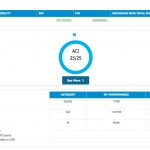Value-Based Care
Drs Edgerton, Worthing and Hausmann addressed the roots of value-based care, including the use of the Sustainable Growth Rate (SGR), a formula for controling physician payment in the late 1990s that later failed.
After the SGR’s failure to rein in costs, “There was a big discrepancy between what the budget formula was going to be to pay for medical care and what the reality of increasing costs were,” Dr. Worthing says. “Congress constantly needed to find the money to plug the gap. The doctors and hospitals would continually lobby Congress to close that gap in order to keep the system going.”
That situation led to the development of the Merit-Based Incentive Payment System (MIPS), which is a modified value-based, fee-for-service system; or joining an alternative payment model (APM).
At Dr. Worthing’s clinic, patients are seen on a fee-for-service system, and Medicare patients are seen as part of MIPS. “We’re trying to make sure that what we do has value as that system defines it, making sure we have quantified rheumatoid arthritis [RA] disease activity,” Dr. Worthing says. This approach includes performing a Clinical Disease Activity Index and tracking and documenting osteoporosis screenings, among other things.
Dr. Edgerton shared his experience working with a value-based contract with the clinic’s major commercial insurer. “For patients with [RA], we have sort of an algorithmic pathway that’s laid out by which we ensure that we measure disease activity and track the use of different medications based on those disease activity scores so that decisions are made according to what the patient really needs,” he says.
Drs Edgerton and Worthing also addressed how they manage external costs under a value-based care model. Example: What happens to costs if a patient is sent for an MRI?
“You have to make sure that you’re not trying to control costs that really aren’t attributed to your care,” Dr. Edgerton says, pointing out that costs in RA are usually related to medication use. “What we’ve tried to avoid and done successfully with this contract is being held accountable for things like an emergency room visit.”
Get Involved
Rheumatologists have multiple options to become more involved with government affairs and initiatives related toward value-based care, according to Dr. Edgerton and Worthing. They can use the ACR’s RISE Registry to submit measures that need to be sent to Medicare.
Also, the ACR’s Legislative Action Center enables rheumatologists to stay current on advocacy efforts led by the ACR, Dr. Edgerton says. Through the Action Center, physicians can take part in federal campaigns and email pre-written letters to Congress. Examples: The ACR is currently conducting a campaign urging the Senate to modernize prior authorization in Medicare Advantage plans. Some other efforts to advocate for legislative solutions include such issues as workforce shortages, step therapy protocols, pharmacy benefit manager transparency and more.


